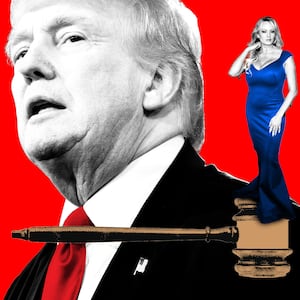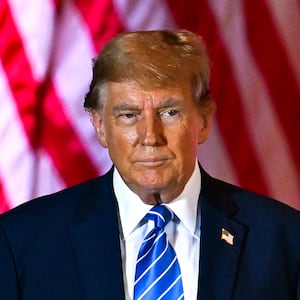Just a couple weeks ago, before prosecutors handed over about 200,000 new documents to the former president’s defense team and the judge delayed the proceedings, March 25 was supposed to be the start date of Donald Trump’s first criminal trial. And until a pre-trial hearing for the hush money case started on Monday, March 25 was supposed to be the day—as the former president’s lawyers believed—the judge might excoriate prosecutors over the missing evidence and potentially issue sanctions against them.
But when the hearing was over Monday, it was clear March 25 will instead be remembered as the day the judge slammed Trump’s lawyers for more waiting games and set the new trial date for April 15.
New York Supreme Court Justice Juan Merchan declined to issue sanctions against attorneys on either side, but he determined that a short-lived document scandal had essentially amounted to nothing.
“The defendant has been given a reasonable amount of time to prepare,” he said, ordering jury selection to begin in 21 days.
The judge indicated that the trial will commence days before the Jewish holiday of Passover and New York City’s spring break, but he promised not to hold court on any day that week if it would violate a person’s religious views.
Trump walked out of the courtroom with a grim look on his face, tossing a thumbs up at an acquaintance in the audience and whispering “thank you.”
Half an hour later, Trump held a press conference at his 40 Wall Street building south of the courthouse, where he defiantly claimed he's still unsure if the trial will start April 15.
"I don't know if we're having one," he shrugged.
He also derided Merchan as a “Democrat judge” accusing him of interfering with the 2024 election for moving the trial forward during Trump’s presidential campaign.
“He knows it,” he said, later adding, “it's a disgrace what's happening to our country.”
Monday’s hearing knocked down what was perceived to be Trump’s last-ditch attempt to push back his trial, but it also served as the latest example of a judge running out of patience with Trump’s disruptive legal strategy.
Merchan questioned Trump’s legal team for more than an hour for what he eventually called a “misleading” tactic that threw trial plans into chaos this month, following a confusing moment when the feds suddenly dumped 200,000 pages of evidence.
Merchan laid the blame entirely at Trump’s feet, appearing flummoxed that the former president’s lawyers managed to briefly derail the trial with over-the-top accusations. He implied that this amounted to nothing more than continuing delay games.
The judge took particular aim at Trump defense lawyer Todd Blanche, saying that he should have known to seek out records for his client instead of sitting back and waiting for the Manhattan District Attorney’s Office to produce them—only to complain about it on the eve of trial. And Merchan didn’t hold back, noting that Blanche is a former federal prosecutor at the U.S. Attorney’s Office for the Southern District of New York, the very same office now at the center of a storm over missing evidence.
“You were there for 13 years. So you know that the defense has the same ability as the prosecution to obtain these documents. So when you received the people's first production, you could have very easily done exactly as you did in January. but for whatever reason you waited until two months before trial,” Merchan said.
“Your Honor,” Blanche began to say.
“Why didn’t you do it in June? Or July?” the judge continued.
Blanche tried to deflect blame back to the DA, citing a New York law that requires turning over evidence.
“It's not our job to get it,” he said.
“It's not the people's job either,” the judge shot back.
The judge seemed perturbed that Trump’s team never brought up any of these issues during what was supposed to be the final pre-trial hearing on Feb. 15—only to have this issue crop up a month later, just weeks before the start of the first ever criminal trial against a former American president.
In court, Blanche continued to blame the DA’s office, claiming that the batch of records his team had just received from the U.S. Attorney’s Office for the Southern District of New York proved that DA prosecutors held back evidence.
For more than a year, the former president’s legal team has been trying to probe the personal life of Michael Cohen—the one-time Trump confidante who has since become a key witness in the DA’s case—and they scored a win by prodding SDNY for Cohen’s emails despite resistance from the DA and even the judge.
“There’s tremendous amounts of bank records that were produced, and people think we can simply ignore those,” Blanche said in court. “I mean, thousands and thousands… meetings with witnesses and the FBI related to the 2016 election.”
“You mean the Mueller investigation?” the judge asked impatiently, referring to the Justice Department’s Trump-Russia investigation.
“Yes,” Blanche responded.
“That’s not relevant,” Merchan shot back. “That has nothing to do with this case. I decide if it’s relevant. If you’re going to offer something from the Muller investigation, it’s not coming in.”
“The witness discussed what his job was,” Blanche said.
Prosecutors have decried the invasive maneuver as nothing but a vengeful payback scheme to discredit a valuable witness and distract from the real issue: how Trump engaged in a coverup, using Cohen as a cutout to deliver Stormy Daniels $130,000 to keep her quiet about their one-night stand in order to save his 2016 presidential campaign from an embarrassing scandal and faking business records to hide Cohen’s reimbursement.
When the judge turned to the DA’s team, he heard an alternate take from Matt Colangelo, an assistant district attorney who has investigated Trump for years at the Attorney General’s office and now with the DA. Colangelo told the judge that most of the documents recently produced by the feds were mostly copies that Trump already had—and actually strengthened the case, not weakened it. Merchan pointedly asked how many records were actually new.
“Three hundred records or fewer… almost exclusively cumulative and largely inculpatory,” Colangelo said.
“Largely inculpatory?” the judge asked.
“Right, your Honor,” the prosecutor responded.
Although DA Alvin Bragg Jr. was in the courtroom, he remained quiet and seated with the audience a few feet behind the table where his prosecutors argued the case.
But the judge appeared almost enraged when he called attention to the way Trump tried to fabricate a scandal and drag in the court itself, noting how Trump has alleged in documents that the DA has held back evidence and was attempting to make the judge “complicit” in an “unethical strategy.” The judge narrowly defined the DA’s responsibilities, then when Blanche couldn’t cite cases that said otherwise, Merchan let it rip.
“If you don’t have a case right now, that is really disconcerting, because the allegation the defense makes in all of your papers about the people's misconduct is incredibly serious. Unbelievably serious,” Merchan said. “You are literally accusing the Manhattan DA's office... of engaging in prosecutorial misconduct—and of trying to make me complicit in it. And you don't have a single cite to support that position, that the people by not obtaining the documentation at the US Attorney's Office had somehow committed some sort of fraud on the court?”
While Trump was in court, he managed to score a temporary victory in his other ongoing legal nightmare in New York State. An appellate court gave him an extra 10 days to come up with the money necessary to halt the New York Attorney General from seizing his various properties as a result of losing a three-month bank fraud trial. Trump had previously failed to find a surety company willing to prove him a half billion dollar lifeline to halt last month’s $464 million judgment before a Sunday night deadline, but the appeals court lowered the sum needed to pause seizures down to $175 million.
Monday marked the first day that New York AG Letitia James could have moved to seize his various properties, something that Trump earlier in the morning was raging about on his Truth Social media site.
“Why should I be forced to sell my ‘babies,’” he complained in a post just before heading to the Manhattan courtroom for the day’s hearing.
James has already effectively put a blanket lien on his 212-acre, forested estate of Seven Springs north of the city earlier this month.








